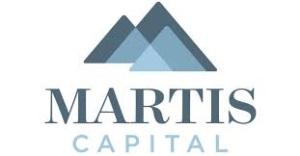In our fifth COVID-19 virtual roundtable, Axial and co-host Martis Capital focused on the current state of healthcare M&A. The discussion focused on a variety of topics including which healthcare sectors have been hit the hardest, which have come out stronger or unscathed, the trajectory for healthcare M&A in the coming months, changing valuations, and how operators are dealing with unforeseen challenges.
In partnership with:

We’d like to thank Martis Capital, along with the below attendees for their participation:
- Nick Berry, Principal, Clearview Capital
- Rachel Boynton, Managing Director, Vertess
- Dexter Braff, President, The BRAFF Group
- John Cote, Managing Partner, Sunny River Capital Management
- Andrew (Andy) Cowherd, Managing Director, England & Company
- David Crean, Managing Director, Objective Capital Partners
- Owen Davis, Partner, Martis Capital
- Stewart Jamieson, Vice President, Hammond Hanlon Camp
- John Lemelman, General Partner, Riverside Partners
- Jonathan Sadock, CEO & Managing Partner, Paragon Ventures
- Jon Santemma, Co-Founder & General Partner, Regal Healthcare Partners
- Barry Uphoff, Managing Partner, Martis Capital
Video
Watch the recording on Vimeo:
Audio
Stream audio only via SoundCloud:
Show Notes
Introductions – 00:00-21:07
Regulatory developments – 21:07
- HHS has done a great job getting money into the hands of providers during this crisis (they’ve earmarked $30B as direct grants)
- There has been some flexibility in using Facetime to talk with patients as a form of telehealth
- Top things to look at: FFCRA legislation, 7A programs
- Other programs: employee retention tax credit, tax provisions that allow you to push off payroll taxes/Q1 filings, mid-size treasury program
- Telehealth practices will be adopted more and more going forward, and this will help loosen up the regulations
How are rent payments being handled? – 31:50
- Going into this downturn, retail landlords were already struggling, so they’re being fairly understanding right now because they don’t want their tenants going out of business
- Retail is oftentimes getting a few months of rent totally free, whereas office landlords seem to be more about deferrals (i.e: we’ll tack the next two months of rent onto the end of your existing lease)
PPP funds – 34:48
- The problem with PPP is the affiliate requirements, but funds who owns smaller companies and are able to squeak in under the 500 employee test still aren’t sure if they’ve been approved for funds
- If you own a professional corporation, you have to apply through the PC and there are issues of risk for the group of doctors that own it
- If your business happens to have any SBIC designation that you may have inherited from when the founders owned it, that is beneficial
- The application process has been really complicated and resource-intensive — very well-established firms are still struggling to parse through all of the information and still are unsure about eligibility
- LBOs make it even more difficult; your first discussion has to be with your senior lender, but generally lenders have been pretty collaborative since this is something out of everyone’s control
- Banks were the villains in the 2008 financial crisis, so they seem to be more flexible this time around because they’re trying to make a better name for themselves
Retail health – 39:12
- There will be more opportunity for healthcare retail locations as more traditional retail continues to move toward e-commerce
- A lot of providers are going to come out of this very scarred; for smaller businesses that don’t have the backing of a bigger group, they’re already wishing they had the stability and were part of something larger
- There will be a confluence of telemedicine and retail locations
- Now is an interesting time to open new retail locations if you’re able because there is plenty of time to get them set up
Telehealth – 42:10
- One firm’s mental health business (national business) that used to be 100% face-to-face is now 70% telehealth and they have not lost any volume
- A lot of home health and day programs have migrated over to telehealth for check-ins
- Durable Medical Equipment (DME) has lessened restrictions so you can use telehealth for some prescribing and checking in, and they’ve also waived documentation to make things easier
- For some home health visits (like checking vitals) you still need to do it, but you can fill in in other areas
- Regulatory bodies have loosened a lot of requirements to get care to patients, but what will that mean when things return to normal? Then, what will be considered “compliant”?
- How are buyers going to view this in diligence; how can you evaluate if a company is compliant or not when standards are currently up in the air?
- There has been a decrease in time spent with patients due to telehealth, so billing has been affected since it’s based on duration of services
- These new guidelines could presumably stick around once we’re on the other side
- Telehealth is an area to look at during COVID, but being able to forecast the steady state for pricing, reimbursement and demand after the next 12-18 months is really challenging; this could result in more structured minority deals
- Whether spikes are up or down, it is tough to forecast where any company will be in a year
- Normalizing any business is virtually impossible right now; all deals that close within a certain time frame are going to have a lot of contingencies
Are deals going to close? – 52:50
Opinion #1 – no:
- All bankers and private equity firms are saying that they’re open for business, but fundamentally, are firms going to be writing checks when they’re unable to meet people?
- Creative forecasting is great, but it’s not likely going to hold up against a $20M check
- After this hardcore social distancing, we’re likely just going to move on to social-distancing light, which won’t necessarily help in terms of deal closings
Opinion #2 – yes:
- It’s an interesting exercise submitting an LOI right now, because how do you structure the exclusivity period — is it tied to an in-person visit or is it just a longer period?
- Owners who need to transact, whether it’s due to finances or health, will need to get a deal done regardless of the state of the market
- This asset-class is supercharged by dry powder right now
- It will all become part of the competitive landscape — if you’re one of the first one back on the road, you’re likely going to get the deal done because other people aren’t moving
- If you don’t need leverage, you could be in a great place
- This is a good opportunity to reign in the “runaway multiples,” and it will force sellers to recognize that some of their prior offers have actually been fair deals
- The earnout concept is gaining ground as an effective way to bridge the valuation gap
- Some sellers are trying to create earnout provisions where the payment comes in whether they hit milestones or not
Sector-related deal status updates – 1:04:01
- Behavioral health deals are closing
- Opioid transactions are still happening because people who needed methadone still need methadone
- Transactions that were sufficiently baked prior to mid-March (diligence was far along, in-person meetings had occurred) are the ones that Axial has seen closing
- Deals that have collapsed were because buyers had to turn full attention to their company or portcos and they wouldn’t have had the time to integrate
- Platforms seem more likely to close because there’s not the same level of integration
- DME has seen an increase in LOI submission because of high demand, they’ve been carved out of competitive bidding, and there’s increased reimbursement through CMS
- An area that has seen some softness (not a huge amount) is that focused on CPAP — there’s some discretion about necessity for some patients, and they have to do in-person fittings
- The removal of ventilators from competitive bidding in the Home Medical Equipment (HME) sector has really increased interest in these companies
- There are some additional challenges that come along with geographies (like NYC) that are hardest hit; some closings are contingent on inspections by cities or states that aren’t operating at full capacity
Organizing diligence streams – 1:12:43
- Investors are having a hard time with diligence without in-person opportunities
- It’s much more plausible to make meaningful progress on a deal where you already have a lot of experience, but if you’ve never owned a similar company before, it’s much tougher right now
- The ability to get a great read on management is really tough to get via Zoom
- Accountants and lawyers are often fully remote anyway, so this portion of the diligence process actually doesn’t have to change at all
- If you need to understand competitors, a new supply chain, etc. a lot of the fundamental industry diligence relies on site visits, trade shows, and other in-person travel
- If you don’t need leverage, there is tremendous opportunity right now, but you need to be willing to close without dotting every “i” and crossing every “t”
- Now is a great time to get ready for future processes: get data rooms set up, identify buyer lists, prepare documentation
Have business owners been receptive to advice? 1:19:20
- Business owners are very interested in talking just to hear where the market is going
- Everyone wants to get a sense for what their options are
- That said, there is so much going on that requires management’s attention that most are not interested in actually transacting
- Good advice should focus on how to NOT come to market right now
Once the market comes back, will it rebound quickly? 1:20:50
- Buyers always seem to adjust valuations much more quickly than sellers
- Buyers will probably be looking for situations where they can take advantage of good deals, but sellers could take a lot longer to adjust to the new normal
- Baby boomers who may have been reluctant to transact in the past couple of years because they were collecting paychecks and were comfortable, may be looking at things much differently now
- Will PE firms be under pressure to transact immediately because they’ve had dry powder sitting idle for a long time already?
- After 2008, the lower-end of the market is what bounced back the fastest. That said, in this crisis, the smaller businesses are the ones that are being hit a lot harder, so that may also have an effect
Previous COVID-19 Virtual Roundtables
Roundtable 1: How Coronavirus Is Impacting Lower Middle Market M&A Activity
Roundtable 2: Portfolio Company Crisis Management
Roundtable 3: Distressed Investing
Roundtable 4: PE Business Development Post-Coronavirus
If you’re interested in participating in Axial’s virtual events, including our upcoming Concord conference, please email [email protected] for more information.


